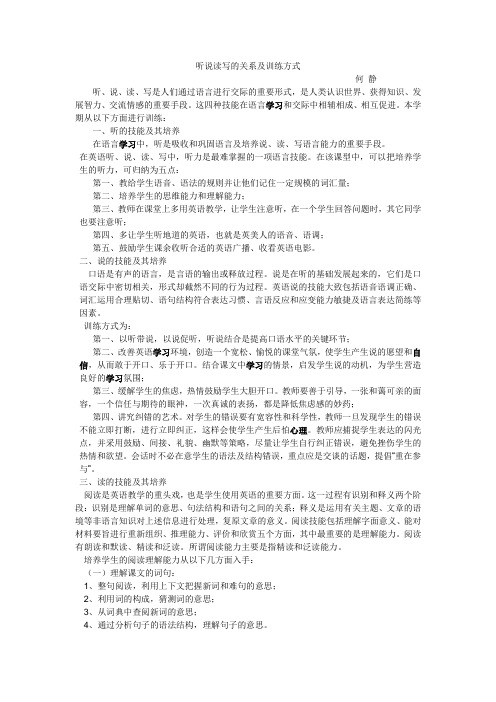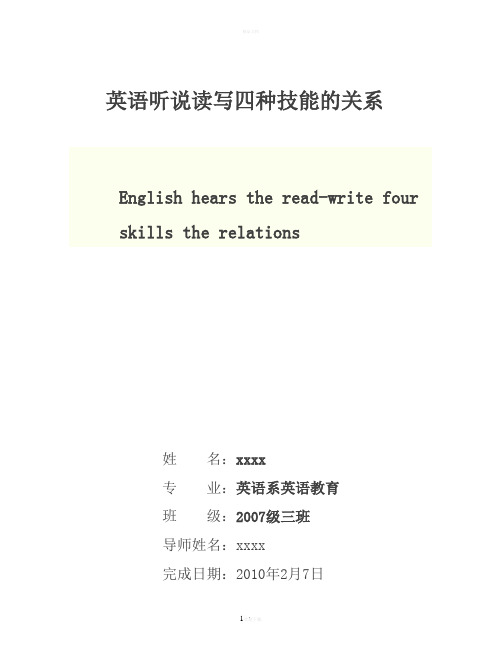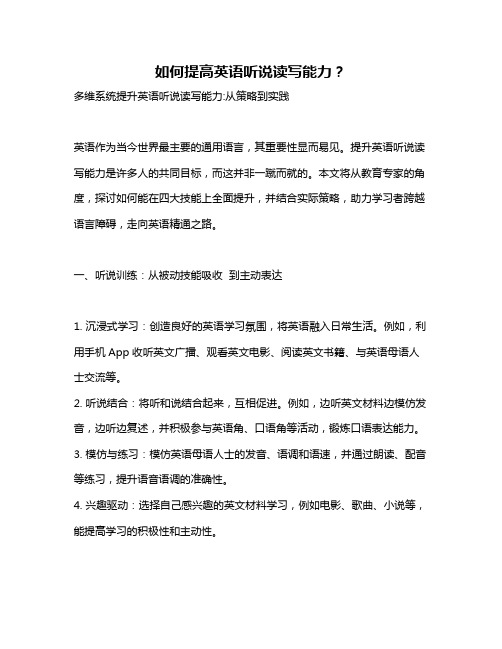英语听说读写四种技能的关系及其培养
听说读写的训练方式

听说读写的关系及训练方式何静听、说、读、写是人们通过语言进行交际的重要形式,是人类认识世界、获得知识、发展智力、交流情感的重要手段。
这四种技能在语言学习和交际中相辅相成、相互促进。
本学期从以下方面进行训练:一、听的技能及其培养在语言学习中,听是吸收和巩固语言及培养说、读、写语言能力的重要手段。
在英语听、说、读、写中,听力是最难掌握的一项语言技能。
在该课型中,可以把培养学生的听力,可归纳为五点:第一、教给学生语音、语法的规则并让他们记住一定规模的词汇量;第二、培养学生的思维能力和理解能力;第三、教师在课堂上多用英语教学,让学生注意听,在一个学生回答问题时,其它同学也要注意听;第四、多让学生听地道的英语,也就是英美人的语音、语调;第五、鼓励学生课余收听合适的英语广播、收看英语电影。
二、说的技能及其培养口语是有声的语言,是言语的输出或释放过程。
说是在听的基础发展起来的,它们是口语交际中密切相关,形式却截然不同的行为过程。
英语说的技能大致包括语音语调正确、词汇运用合理贴切、语句结构符合表达习惯、言语反应和应变能力敏捷及语言表达简练等因素。
训练方式为:第一、以听带说,以说促听,听说结合是提高口语水平的关键环节;第二、改善英语学习环境,创造一个宽松、愉悦的课堂气氛,使学生产生说的愿望和自信,从而敢于开口、乐于开口。
结合课文中学习的情景,启发学生说的动机,为学生营造良好的学习氛围;第三、缓解学生的焦虑,热情鼓励学生大胆开口。
教师要善于引导,一张和蔼可亲的面容,一个信任与期待的眼神,一次真诚的表扬,都是降低焦虑感的妙药;第四、讲究纠错的艺术。
对学生的错误要有宽容性和科学性,教师一旦发现学生的错误不能立即打断,进行立即纠正,这样会使学生产生后怕心理。
教师应捕捉学生表达的闪光点,并采用鼓励、间接、礼貌、幽默等策略,尽量让学生自行纠正错误,避免挫伤学生的热情和欲望。
会话时不必在意学生的语法及结构错误,重点应是交谈的话题,提倡“重在参与”。
英语学习应该如何兼顾听说读写?

英语学习应该如何兼顾听说读写?英语学习的最终目标,是实现语言的有效运用,而听说读写四项技能相辅相承,缺一不可。
在教育教学实践中,如何更有效地注重四项技能,促进学生全面发展,是值得深入思考的问题。
一、听说读写相互关联,相互促进四项技能并非孤立存在,而是相互联系,相互促进。
例如:听说进一步促进读写:听力训练可以帮助学生积累词汇和语法知识,进阶对语言的理解能力,为阅读理解打下基础;口语训练可以帮助学生将所学知识转化为语言表达能力,为写作提供素材和表达。
读写促进听说:阅读可以增加学生词汇量,提高语法理解能力,为听力理解提供语言基础;写作训练可以帮助学生整合逻辑思维,提高表达能力,为口语表达提供框架和素材。
二、更加注重四项技能的教学策略整合式教学:以主题为导向,将听说读写四项技能融合,围绕一个主题进行听力材料的理解、阅读理解材料的分析、口头讨论和写作练习,基于技能的综合运用。
任务型教学:以完成任务为目标,设计情景式、互动式和合作式的学习活动,如扮演类、模拟真实对话、小组合作完成项目等,让学生在真实的任务情境中运用语言,提升语言运用的能力。
分层教学:依据学生的英语水平差异,制定有所不同的教学目标和教学内容,并提供个性化的学习资源和指导,满足不同学生的学习需求。
多元化测评:需要多元化的测评,如笔试、口试、项目展示、课堂参与等,全面评价学生的语言能力,并依据评估结果调整教学。
三、家庭教育的协同作用营造英语学习氛围:家长可在家中营造温馨的英语学习氛围,如播放英语歌曲、阅读英语书籍、观看英语电影等,为孩子提供接触英语的机会。
鼓励孩子出声说英语:家长要帮助和鼓励孩子大声说英语,即使错误也要给予积极的反馈,并提供必要的纠正,指导孩子如何改正语言错误。
积极参与孩子的英语学习:家长可以积极地组织孩子的英语学习,为孩子提供学习资源,帮助他们学习英语,并帮助孩子克服学习中遇到的困难。
四、结语更注重听说读写四项技能,是提高英语学习效率和语言运用能力的关键。
听说读写四种能力之间的关系

听、说、读、写四种语言能力之间的关系一、什么是听力?听力就是对通过“听”这个行为所获得的听觉刺激进行有意识地处理;听力是交流过程中准确接受和解读信息的能力。
(一)听力是人类第一语言技能观察一下我们身边的咿呀学语的小孩儿,我们就会发现即使是尚未学会说话的小孩很多时候也能听懂大人说话,明白大人的意图。
听得多了,便开始模仿,学着说话。
所以,从人类语言学习的自然过程来看,听力是人类语言的第一技能,也是我们获得语言信息的第一种途径。
(二)听力是口头语言交流的基础我有一个朋友去了一趟美国,她在国内学过一些英语。
回来以后谈感受时说,她英语水平不高,但尚可以通过单词的堆积来表达自己,她最大的困难是听不懂那些美国人说什么,所以交流起来很困难。
从这个例子我们可以看出,听力是口头语言交流的基础,在实际交流中,它的重要性要超过口语。
因此,我们在日常教学中要非常重视学生听力的培养。
(三)母语听力与外语(英语)听力语言环境的差异对我们中国人来说,英语是一门外语。
在汉语教学中,我们一般不设听力课,那是因为,在日常学习和生活中我们用母语交流,每天都有大量的母语通过我们的耳朵输入。
有研究发现,我们每天有70% 的时间都在进行某种形式的语言交流,其中 45% 的时间我们在听(如下图)。
相比之下,我们学习英语的听力环境就没有这么好。
我们的生活中很少有用英语进行交流的时候,尤其是口头交流。
假如没有可以创造的机会或专门设置的听力训练课,我们几乎没有机会听到英语。
因此,作为英语教师,我们不仅应该充分认识听力在语言学习中的重要地位,而且还要探索如何给学生提供足够的听英语的机会,和科学的听力训练方法。
二、课标对高中六级英语听力的要求1. 能抓住所听语段中的关键词,理解话语之间的逻辑关系;2. 能听懂日常的要求和指令,并能根据指令进行操作;3. 能听懂故事或记叙文,理解其中主要人物和事件以及他们之间的关系;4. 能从听力材料、简单演讲或讨论中提取信息和观点。
论文:英语听说读写的四种关系

英语听说读写四种技能的关系English hears the read-write four skills the relations姓名:xxxx专业:英语系英语教育班级:2007级三班导师姓名:xxxx完成日期:2010年2月7日目录摘要................................................................IA b s t r a c t.. (2)引言................................................................1一、英语学习听、说、读、写的介绍1.听。
.............................22.说。
.................................23.读。
.................................34.写。
.................................3二、英语学习听、说、读、写要全面1.英语范围内的全面发展.................42.英语听说读写具体事例分析.................4 结语.................................5参考文献...............................6摘要本文结合《英语课程标准》的要求阐述了“听、说、读、写”之间的关系,并对“听、说、读、写”这四种技能的实践培养进行了论述。
这四种能力的培养,有利于提高学生学习英语的兴趣和自信心,有助于提高教学质量。
关键词《英语课程标准》听力阅读口语写作AbstractThis article unifies "English Curriculum Standard" the request elaborated “listened to, saying that to read, writes” between relations, and right “listened to, saying that to read, writes”these four skill practice raise to carry on the elaboration. These four kind of ability's raise, is advantageous in enhances the student to study English the interest and the self-confidence, is helpful in improves the quality of teaching.Key word "English Curriculum Standard" hearing reading s poken language writing引言根据《英语课程标准》,语言技能包括听、说、读、写技能以及这四种技能综合运用能力。
英语听说读写四种技能的关系及其培...

英语听说读写四种技能的关系及其培养(The relationship between four skills in English listening, speaking, reading andwriting and their training)The relationship between four skills in English listening, speaking, reading and writing and their trainingAbstract: the English curriculum standard points out that language skills include listening, speaking, reading and writing skills, and the combined use of these four skills. This paper expounds the "English curriculum standard" listening and speaking, reading and writing between the relationship, according to the "English curriculum standards" requirements of the cultivation of students' listening, speaking, reading and writing "four skills are discussed and practice. Practice has proved that the cultivation of these four abilities will help to improve students' interest and confidence in learning English, and help to improve the quality of teaching.According to the English curriculum standards, language skills include listening, speaking, reading and writing skills, and the combined use of these four skills. Listening, speaking, reading and writing are important forms for people to communicate through language. They are important means for human beings to know the world, acquire knowledge, develop intelligence and communicate emotion. Linguists divide language skills from different perspectives. In the form of language, listening and speaking are spoken, while reading and writing are written. Spoken language is the written form of written language, and written language is the written record of spoken language. From the development of human language, isthe primary spoken language, written language is secondary; spoken and written in the manner and means of expression, and vocabulary, syntax, information density and language function has the obvious difference. From a cognitive point of view, listening and reading are the ability to understand words and input information. Speaking and writing are expressions of ideas, and they are information output skills. These four skills complement each other and promote each other in language learning and communication. From the perspective of English language teaching, the author will discuss his own views on these four abilities and their relationship and how to train these four skills.I. listening skills and their trainingWhat is listening? Generally speaking, listening is the ability to recognize and understand what other people are saying. "Listening" is English Listening comprehension, that is, listening to the sound language, and the ability to understand it.Listening is a passive skill, and listening is a process of understanding and receiving information mechanically and passively. Listening is the basic form of communication in English learning and even in human communication. It is the communicative ability to understand and absorb oral information. In language learning, listening is an important means of absorbing and consolidating language and developing the ability to speak, read, and write languages.In English listening, speaking, reading and writing, listeningis one of the most difficult skills, because it is influenced by six factors as follows: (a) speech materials; 1, the structure of materials; 2, 3, 4 speed; frequency;, stress, intonation and rhythm; 5, wordy in the context of information; (two); (three) related knowledge; (four) Chinese knowledge; (five) phonetic and grammatical rules and vocabulary size; (six) thinking strategy. Of the six factors, the first four factors are objective, not determined by the listener. Then, where should we begin to train the students' listening ability? In the English curriculum standard, it is pointed out that the requirements of six levels of listening can extract information and opinions from listening materials, and understand the logical relations between sentences. Therefore, to train students' listening ability, we should first break through the above obstacles and master the basic skills of listening. Can be summarized as five points: first, to teach students pronunciation and grammar rules and let them remember that a certain amount of vocabulary; second, cultivate students' thinking ability and understanding ability; third, teachers use English Teaching in the classroom, let the students listen and answer the questions in a student, other students have to pay attention to; fourth, let the students listen to authentic English, is English pronunciation and intonation; fifth, encourage extracurricular listening to English radio, watch English TV programs right.In the course of teaching English listening, the author's personal teaching experience is to make reasonable arrangements for teaching content, as much as possible to save time and efficiency. According to the survey data, the best time for students to attend the lecture is the first 30 minutes. Theteacher should arrange the most difficult teaching task during this period to teach the best teaching effect. In order to avoid student fatigue, listening lessons can be interspersed to listen to humorous little stories or English songs. In the teaching of listening comprehension, teachers should make proper use of teaching materials, and pay attention to the difficulty and ease of teaching materials. To understand the students, to understand their learning characteristics, and in accordance with their specific circumstances to give timely guidance. We should evaluate the students' learning situation and level in time, and see whether it meets the requirements of the syllabus. In the listening class regularly test is very necessary, through the test of teachers to understand the students' learning, make a correct evaluation of each student to be aware of, and the next step of the teaching work. English listening course should train and train students' listening skills from these aspects,These include the ability to understand the tenor of the talk or report, the ability to capture specific details, key words and topic sentences, the ability to understand the speaker's intentions, and the ability to understand and understand the speaker's attitudes and tendencies. In order to train students' English thinking ability, teachers should give lectures in English as much as possible in order to create a good language environment.Two, speaking skills and their trainingSpoken language is a speaking language, which is the output or release of speech. Speaking is developed on the basis oflistening, and they are closely related to each other in verbal communication. The skills of speaking English include pronunciation, intonation, vocabulary usage, sentence structure, expression habit, speech response and response ability, agility and conciseness of language expression.In the English curriculum standard, students in grade five of junior high school can perform short plays in English. They can make situational dialogues according to the topic. Therefore, the cultivation of students' ability to speak must start from the following aspects: (a) to listen to the tape, to promote listening, I heard that combination is the key to improve spoken English; (two) improve the English learning environment, creating a relaxed and pleasant classroom atmosphere, make students produce confidence and desire to say to dare to open, willing to open. Combination of text learning scenarios, inspire students motivation, open up English week, English corner, English radio, summer camp and other activities, to create a good learning environment for students; (three) to alleviate the anxiety of the students enthusiasm, encourage students to boldly open. Let the students dare to speak. This is the prerequisite for developing English speaking ability. As Einstein said, "intellectual achievement depends on the greatness of character."." In teaching, we find that people who speak and speak with confidence are better at speaking english. Teachers should be good at guiding, a courteous and accessible face, a trust and look forward to the eyes, a sincere praise, is a low anxiety medicine; (four) pay attention to the art of error correction. The students' mistakes must be tolerant and scientific, once the teachers found that students can not immediately interrupted, immediately corrected, this willenable students to produce scared psychology. Teachers should capture the flash points of their students and adopt strategies such as encouragement, indirectness, politeness and humor, so as to help them correct their mistakes and avoid the students' enthusiasm and desire. Conversation should not pay attention to students' grammatical and structural errors, the emphasis should be on the topic of conversation, and advocate "participation"".Dialogue and free conversation is an effective way to practice spoken English. It can improve students' interest in English, and over time, English speaking habits are formed. The author pays attention to the training of "Free talk" before class. Every few minutes before class, we have to review the contents of the front, here can not simply dictation words, dictation sentences, but to make full use of time for "Free talk" free talk. For example, some simple but often encounter problems, such as: How do you to usually go to work How can you get along? Well with your colleagues Who is your favorite? Actor / actress? Let the students to fully express their views, to practice oral English; I have put forward some topics, students always discuss unusually warm, such as: To eat is to 1ive or to live is to eat What do you think is a? Good job? Do you like to live in the suburb or city centre? After discussion, teachers summarize. This is also an effective way to train students' oral expression ability. Content to review, consolidation is better, more close to the daily life of students, easy to open, not easy to forget, it is best to start with phrases. In the form, teachers and students can work in a two-way way, gradually turning to students, changing their ways and creating a real English environment, so that students feel that they arecommunicating rather than acting. In this way, not only consolidate the knowledge learned, but also preliminary taste of the joy of spoken dialogue. This is also the basis for further development of oral expression ability. I try to speak in lectures, lively and interesting, in the completion of the teaching task and often give students with some English songs, talk shows, anecdotes, humorous stories, quotes the parody, to stimulate students' interest in learning. I am speaking of parody, such as To Lie or Not To Lie the Doctor s Di1emma "(to lie or not to lie - the doctor's problem), it is a parody of Shakespeare's famous drama" Hamlett "in: to be, or not to be that is the question (live or die - this is a problem). And then I'll give you some examples of how to make the students understand, improve their interests and deepen their understanding of English, such as I, came, I, saw, I, saw, conquered,I saw, I conquered), pointed out that this is a feeling of Western missionaries and explorers arrived in Tibet when issued, this sentence imitated Rome general Kaiser I came, saying: I saw, I conquered. (I came, I saw, I conquered). Although only one word, but people feel full of wit and humour.Three, reading skills and their trainingReading is the highlight of English teaching and an important aspect for students to use english. Reading is a complex mental and intellectual activity, a cognitive process that involves assumptions, validation, imagination, and reasoning. Identification and interpretation of this process has two stages: identification is the relationship between meaning andsyntactic structures and sentence understanding words; interpretation is to use the theme of the context of non linguistic knowledge of the information processing, restoration of the meaning of the article. Reading skills include comprehension of the literal meaning, reorganization of the material subject, reasoning ability, evaluation and appreciation of the five aspects, the most important of which is the comprehension ability. Reading aloud and silent reading, intensive reading and extensive reading. Reading ability mainly refers to intensive reading and extensive reading ability."English curriculum standard" in junior high school students of grade five, according to the context and word formation inference, understand the meaning of the words can be found in the article; the theme, understand the plot of the story, the story of the development of prediction and possible outcomes. Therefore, the cultivation of students' reading comprehension ability from the following aspects: (a) understanding of the text: 1 words, sentence reading, grasp the new words and difficult sentence using context; 2, the use of word formation, guess the meaning of a word in the dictionary; 3, check the meaning of the new words; grammatical analysis of sentence structures 4, by understanding the meaning of the sentence. (two) analyze the structure of the article: 1. Find the topic sentences of each paragraph; 2, say the main idea or the main points of each paragraph; 3, point out the transition and inflection of the article; 4. Point out the relation between the preceding and the following. (three) extract the vocabulary, phrases, phrases, important contents or useful knowledge of the article. (four) evaluate the materials that have been read. Toread an article should be brief comments to write, write down their experiences or the view of this, not only to practice writing, but also can improve the identification ability, is helpful to the text of the review, understanding, digestion and memory. (five) to help students choose extracurricular reading materials which are difficult to adapt, increase their reading and broaden their knowledge. The English education process is an active, harmonious and cooperative educational process for both teachers and students, and is the basis of improving English reading ability. The syllabus stipulates that high school students should focus on training students' reading ability. To improve language proficiency and listening and speaking ability as soon as possible, both to read and to read quickly, we must always have the choice of reading and extensive reading of books, especially in english. English watch TV, read English books, newspapers and magazines, improve English literacy, learning English in the specific language environment, to better understand the meaning, broaden their knowledge, understand the cultural background, local customs and practices. Choose a good book to develop interest in reading, to adapt to the students' knowledge level, psychology and thinking characteristics in form and content. A variety of forms, TV, pictures, multimedia teaching, to enable students to learn English in the specific language environment, more conducive to accurately understand the meaning, the content should be informative, interesting and entertaining, make reading become a conscious action of the students. We should choose some interesting stories, fables, biographies, short science fiction, history, geography, folk customs and foreign students living and studying relevant materials, to improve the students' interest in learning, broaden their horizons.Methods from easy to difficult, from the extra-curricular, from less to more, and humbly ask Lenovo, days and months multiplying, and summed up a set of effective reading methods suitable for their own, so as to achieve the goal of fast read.Read more, recite more, use more, pay attention to analysis and accumulation, is the only way to improve English reading ability. The Tang Dynasty poet Du Fu said: "having read more than ten thousand books, writing if there is god." In English reading, students can broaden their knowledge, review words, accumulate vocabulary, familiar with sentence patterns, and understand the cultural background, local conditions and customs. It is helpful for students to master the features of English vocabulary to improve their reading comprehension ability.Contact context to understand new words and improve reading efficiency. When some students meet new words, they go to the dictionary at once. At this point, I always encourage students to use their knowledge and skills to guess the meaning of words. Tell them that can be used to guess the meaning of the words according to word formation; appositive attributive clause, descriptive words, can also provide use context clues to guess the meaning of a word, through the analysis to understand the meaning of the sentence structure.如在奥林匹克誓言重复了所有的参赛者在开始练习“我们发誓我们将参加奥运会......忠诚的竞争,“句中根据“宣誓”发生在比赛之前及我们发誓的内容,可判断誓言为”誓言”。
英语听说读写四种技能的关系及其培养(一)

英语听说读写四种技能的关系及其培养(一)摘要:《英语课程标准》中指出语言技能包括听、说、读、写技能以及这四种技能的综合运用。
本文结合《英语课程标准》阐述了听、说、读、写之间的关系,根据《英语课程标准》中的要求,对学生“听、说、读、写”四种技能的培养进行了论述和实践。
实践证明:这四种能力的培养有助于提高学生学习英语的兴趣和自信心;有助于教学质量的提高。
关键词:听说读写、技能、关系、培养根据《英语课程标准》语言技能包括听、说、读、写技能以及这四种技能综合运用能力。
听、说、读、写是人们通过语言进行交际的重要形式,是人类认识世界、获得知识、发展智力、交流情感的重要手段。
语言学家从不同角度划分语言技能。
从语言的形式来看,听和说是口语,读和写是书面语;口语是书面语的有声形式,书面语是口头语言的文字记录。
从人类语言的发展来看,口语是第一性的,书面语是第二性的;口语与书面语在表达方式与途径以及词汇、句法、信息密度和语言功能方面有明显区别。
从认知角度看,听和读是话语理解和信息输入能力,说和写是表达思想,是信息输出技能。
这四种技能在语言学习和交际中相辅相成、相互促进。
笔者就这四种能力和它们之间的关系以及如何培养学生的这四种技能,谈谈自己的见解。
一、听的技能及其培养什么是听力呢?一般来说,听力是识别和理解别人说话的能力。
听是被动接受的技能,听的言语活动是机械地、被动地理解和接受信息的过程。
在英语学习乃至人类交往活动中,听是最基本的形式,是理解和吸收口头信息的交际能力。
在语言学习中,听是吸收和巩固语言及培养说、读、写语言能力的重要手段。
在英语听、说、读、写中,听力是最难掌握的一项语言技能,因为它受如下六个因素的影响:(一)语音材料;1、材料的结构;2、词频;3、语速;4、重音、语调和节奏;5、拖沓冗长的信息;(二)语境;(三)相关知识;(四)汉语知识;(五)语音、语法规则与词汇量的掌握;(六)思维策略。
在六个因素中,前四个因素都是客观的,不是由听者所决定的。
听说读写四种能力之间的关系

听、说、读、写四种语言能力之间的关系'、什么是听力?听力就是对通过“听”这个行为所获得的听觉刺激进行有意识地处理;听力是交流过程中准确接受和解读信息的能力。
(一)听力是人类第一语言技能观察一下我们身边的咿呀学语的小孩儿,我们就会发现即使是尚未学会说话的小孩很多时候也能听懂大人说话,明白大人的意图。
听得多了,便开始模仿,学着说话。
所以,从人类语言学习的自然过程来看,听力是人类语言的第一技能,也是我们获得语言信息的第一种途径。
(二)听力是口头语言交流的基础我有一个朋友去了一趟美国,她在国学过一些英语。
回来以后谈感受时说,她英语水平不高,但尚可以通过单词的堆积来表达自己,她最大的困难是听不懂那些美国人说什么,所以交流起来很困难从这个例子我们可以看出,听力是口头语言交流的基础,在实际交流中,它的重要性要超过口语。
因此,我们在日常教学中要非常重视学生听力的培养。
(三)母语听力与外语(英语)听力语言环境的差异对我们中国人来说,英语是一门外语。
在汉语教学中,我们一般不设听力课,那是因为,在日常学习和生活中我们用母语交流,每天都有大量的母语通过我们的耳朵输入。
有研究发现,我们每天有70%的时间都在进行某种形式的语言交流,其中45%的时间我们在听(如下图)。
Time Spent Communicating相比之下,我们学习英语的听力环境就没有这么好。
我们的生活中很少有用英语进行交流的时候,尤其是口头交流。
假如没有可以创造的机会或专门设置的听力训练课,我们几乎没有机会听到英语因此,作为英语教师,我们不仅应该充分认识听力在语言学习中的重要地位,而且还要探索如何给学生提供足够的听英语的机会,和科学的听力训练方法。
二、课标对高中六级英语听力的要求1.能抓住所听语段中的关键词,理解话语之间的逻辑关系;2.能听懂日常的要求和指令,并能根据指令进行操作;3.能听懂故事或记叙文,理解其中主要人物和事件以及他们之间的关系;4.能从听力材料、简单演讲或讨论中提取信息和观点。
如何提高英语听说读写能力?

如何提高英语听说读写能力?多维系统提升英语听说读写能力:从策略到实践英语作为当今世界最主要的通用语言,其重要性显而易见。
提升英语听说读写能力是许多人的共同目标,而这并非一蹴而就的。
本文将从教育专家的角度,探讨如何能在四大技能上全面提升,并结合实际策略,助力学习者跨越语言障碍,走向英语精通之路。
一、听说训练:从被动技能吸收到主动表达1. 沉浸式学习:创造良好的英语学习氛围,将英语融入日常生活。
例如,利用手机App收听英文广播、观看英文电影、阅读英文书籍、与英语母语人士交流等。
2. 听说结合:将听和说结合起来,互相促进。
例如,边听英文材料边模仿发音,边听边复述,并积极参与英语角、口语角等活动,锻炼口语表达能力。
3. 模仿与练习:模仿英语母语人士的发音、语调和语速,并通过朗读、配音等练习,提升语音语调的准确性。
4. 兴趣驱动:选择自己感兴趣的英文材料学习,例如电影、歌曲、小说等,能提高学习的积极性和主动性。
二、阅读技巧:从逐字阅读到深度理解1. 词汇积累:形成厚实的词汇基础,通过泛读、背单词、做词汇练习等,不断地积累词汇量。
2. 泛读策略:灵活掌握不同的阅读技巧,例如略读、精读、跳读等,根据阅读理解目的选择不同的阅读策略。
3. 理解能力:注意培养对文章内容的理解能力,从分析文章结构、总结概括文章主旨、推理判断等进阶理解力。
4. 积累素材:从泛读材料中积累词汇、句型、写作素材等,为写作和口语表达提供素材库。
三、写作训练:从模仿练习到托物言志1. 模仿练习:学习范文,模仿其结构、句型和语言风格,掌握英语写作的基本规则。
2. 逻辑思维:培养和训练逻辑思维能力,清晰地表达观点、论证思路,构建文章框架。
3. 语法基础:掌握基本的语法规则,尽量减少语法错误,避免使用错误的语法结构和词汇。
4. 勤于写作:坚持写作训练,通过写日记、写作文、写邮件等,不断练习写作技巧,提升写作水平。
四、读写增强:从输入到输出的循环1. 扩充阅读:从阅读英文文章中,了解不同的写作风格、写作技巧和写作素材,为自己的写作提供参考。
- 1、下载文档前请自行甄别文档内容的完整性,平台不提供额外的编辑、内容补充、找答案等附加服务。
- 2、"仅部分预览"的文档,不可在线预览部分如存在完整性等问题,可反馈申请退款(可完整预览的文档不适用该条件!)。
- 3、如文档侵犯您的权益,请联系客服反馈,我们会尽快为您处理(人工客服工作时间:9:00-18:30)。
英语听说读写四种技能的关系及其培养罗桥中学:阳慧玲摘要:《英语课程标准》中指出语言技能包括听、说、读、写技能以及这四种技能的综合运用。
本文结合《英语课程标准》阐述了听、说、读、写之间的关系,根据《英语课程标准》中的要求,对学生“听、说、读、写”四种技能的培养进行了论述和实践。
实践证明:这四种能力的培养有助于提高学生学习英语的兴趣和自信心;有助于教学质量的提高。
关键词:听说读写、技能、关系、培养根据《英语课程标准》语言技能包括听、说、读、写技能以及这四种技能综合运用能力。
听、说、读、写是人们通过语言进行交际的重要形式,是人类认识世界、获得知识、发展智力、交流情感的重要手段。
语言学家从不同角度划分语言技能。
从语言的形式来看,听和说是口语,读和写是书面语;口语是书面语的有声形式,书面语是口头语言的文字记录。
从人类语言的发展来看,口语是第一性的,书面语是第二性的;口语与书面语在表达方式与途径以及词汇、句法、信息密度和语言功能方面有明显区别。
从认知角度看,听和读是话语理解和信息输入能力,说和写是表达思想,是信息输出技能。
这四种技能在语言学习和交际中相辅相成、相互促进。
笔者就这四种能力和它们之间的关系以及如何培养学生的这四种技能,谈谈自己的见解。
一、听的技能及其培养什么是听力呢?一般来说,听力是识别和理解别人说话的能力。
听是被动接受的技能,听的言语活动是机械地、被动地理解和接受信息的过程。
在英语学习乃至人类交往活动中,听是最基本的形式,是理解和吸收口头信息的交际能力。
在语言学习中,听是吸收和巩固语言及培养说、读、写语言能力的重要手段。
在英语听、说、读、写中,听力是最难掌握的一项语言技能,因为它受如下六个因素的影响:(一)语音材料;1、材料的结构;2、词频;3、语速;4、重音、语调和节奏;5、拖沓冗长的信息;(二)语境;(三)相关知识;(四)汉语知识;(五)语音、语法规则与词汇量的掌握;(六)思维策略。
在六个因素中,前四个因素都是客观的,不是由听者所决定的。
那么,培养学生的听力能力要从哪里入手呢?《英语课程标准》中明确指出六级听力的要求,能从听力材料中提取信息和观点;能理解句子之间的逻辑关系。
因此,培养学生的听力,可归纳为五点:第一、教给学生语音、语法的规则并让他们记住一定规模的词汇量;第二、培养学生的思维能力和理解能力;第三、教师在课堂上多用英语教学,让学生注意听,在一个学生回答问题时,其它同学也要注意听;第四、多让学生听地道的英语,也就是英美人的语音、语调;第五、鼓励学生课余收听合适的英语广播、收看英语电视节目。
二、说的技能及其培养口语是有声的语言,是言语的输出或释放过程。
说是在听的基础发展起来的,它们是口语交际中密切相关,形式却截然不同的行为过程。
英语说的技能大致包括语音语调正确、词汇运用合理贴切、语句结构符合表达习惯、言语反应和应变能力敏捷及语言表达简练等因素。
《英语课程标准》中要求初中五级的学生能用英语表演短剧;能根据话题进行情景对话。
为此,培养学生的说话能力必须从以下几个方面入手:(一)以听带说,以说促听,听说结合是提高口语水平的关键环节;(二)改善英语学习环境,创造一个宽松、愉悦的课堂气氛,使学生产生说的愿望和自信,从而敢于开口、乐于开口。
结合课文中学习的情景,启发学生说的动机,开辟英语活动周、英语角、英语广播、英语夏令营等活动,为学生营造良好的学习氛围;(三)缓解学生的焦虑,热情鼓励学生大胆开口。
教师要善于引导,一张和蔼可亲的面容,一个信任与期待的眼神,一次真诚的表扬,都是降低焦虑感的妙药;(四)讲究纠错的艺术。
对学生的错误要有宽容性和科学性,教师一旦发现学生的错误不能立即打断,进行立即纠正,这样会使学生产生后怕心理。
教师应捕捉学生表达的闪光点,并采用鼓励、间接、礼貌、幽默等策略,尽量让学生自行纠正错误,避免挫伤学生的热情和欲望。
会话时不必在意学生的语法及结构错误,重点应是交谈的话题,提倡“重在参与”。
三、读的技能及其培养阅读是英语教学的重头戏,也是学生使用英语的重要方面。
阅读是一个复杂的心理和智力活动,是不断假设、证实、想象、推理的认知过程。
这一过程有识别和释义两个阶段:识别是理解单词的意思、句法结构和语句之间的关系;释义是运用有关主题、文章的语境等非语言知识对上述信息进行处理,复原文章的意义。
阅读技能包括理解字面意义、能对材料要旨进行重新组织、推理能力、评价和欣赏五个方面,其中最重要的是理解能力。
阅读有朗读和默读、精读和泛读。
所谓阅读能力主要是指精读和泛读能力。
《英语课程标准》中要求初中五级的学生能够根据上下文和构词法推断、理解生词的含义;能找出文章中的主题,理解故事的情节,预测故事的发展和可能的结局。
因此,培养学生的阅读理解能力从以下几方面入手:(一)理解课文的词句:1、整句阅读,利用上下文把握新词和难句的意思;2、利用词的构成,猜测词的意思;3、从词典中查阅新词的意思;4、通过分析句子的语法结构,理解句子的意思。
(二)分析文章的结构:1、找各段的主题句;2、说出各段的大意或要点;3、指出文章的转折及转折词;4、指出文章前后情节的关系。
(三)摘录文章常用的词汇、词组、警句、重要内容或对自己有用的知识。
(四)对读过的材料作评价。
对读过一篇文章都应写出简短的评述,记下自己的心得体会或对文章的看法,这样,既练习了写法,也可以提高分析鉴别的能力,还有助于对课文的复习、理解、消化与记忆。
(五)帮助学生选择难易适中的课外阅读材料,增加他们的阅读量、拓宽他们的知识面。
四、写的技能及其培养英语教学中的写是指书写和写作。
书写包括字母、单词、句子、标点符号的正确书写。
书写的好坏直接影响思想和情感的表达。
若书写不规范、技巧差、字迹潦草或错误百出,必然使人看不清或读不懂,令人生厌;反之,美观流畅的书写作品会给人美的享受,能引起读者的兴趣,产生较好的交际效果。
英语中的写作就是学生用英文表达自己的思想情感的过程,也是用英文影响别人的过程。
英语写的技能包括书写端正、拼写正确、语句通顺、语法规范、层次分明、内容完整、重点突出、详略得当。
英语写作是一个复杂的、有目的活动,它包括构思阶段、转换阶段和执行阶段。
那么如何培养学生的写作能力呢?《英语课程标准》中对初中阶段的写作目标提出了具体的要求:能根据写作要求,收集准备素材;能根据图示写简单的文章、写日记、写信等。
为此,应从以下几方面入手:(一)首先必须丰富他们的生活内容,使他们有话可说,有感可发,有情可抒,有事可叙。
教师必须引导学生从生活中提取有意义的英文写作的主题。
学生每天都与社会生活的各个方面发生着直接的或间接的联系,这是他们学习英文写作表达活动的重要前提。
(二)教师在指导学生进行英文写作活动时,也应该进行由易到难的练习。
这类练习包括两个内容。
从形式上看,在造句练习的基础上,进行英文作文,既由短到长。
从质量上看,在简单的英文作文的基础上,进行要求较高的英文作文练习,即:造句—看图说话、写情景—写段—写作文。
由易到难地进行练习,一方面能够丰富学生的英文写作基础知识;另一方面,能够培养学生的逻辑思维能力,提高英文写作的艺术和手法。
(三)要求学生坚持写日记。
坚持用英文写日记是有助于学生加强记忆、复习所学内容,用所学知识表达自己的思想;日记具有储存信息、编码和组织资料、激发联想等功能,它们是语言内化和输出的过程。
(四)要求学生多练习写看图作文。
看图作文是历年中考、高考使用频率最高的形式。
看图作文的图画内容必须是学生能够用英语表达的。
动笔前应引导学生仔细观察画中的事物、人物、时间、地点、背景及一些细微之处;启发学生概括画中所表达的大意,并根据提示,积极构思一个意思完整、语言表达正确、能达到交际目的短文。
(五)指导学生进行网上交互活动。
电子邮件是开展网上英语交流活动的有效途径之一,它可以将教师与学生,学生与学生紧密联系起来,实现师生和学生之间的互动。
网上交互应该与教学结合起来,让学生在e-mail上提交书面作业或向老师提出问题,教师能够在e-mail上随时解答问题、布置作业、批改作业或发布信息等。
同学之间也可以通过电子邮件分享学习资料,合作完成写作练习。
(六)同学互评法。
同学互评法(peer revision)是一种合作学习,它是学生写作训练过程中一个步骤,也是教师把过程教学法思想贯穿并渗透于写作过程中的一个环节,其做法如下:在完成初稿后,学生不必把初稿交给老师,教师把学生分成两人组或四人组,让学生在课堂上互相传阅作文、提出意见,并讨论修改方案。
在相互评阅与讨论后,学生自己先修改初稿,然后把修改稿提交给老师。
通过互评促进学生之间相互学习,取长补短;增加学生的“读者意识”,使每个学生既是作者又是读者;以达到提高学生英语写作兴趣,提高他们的文学编辑能力;同时能节约老师时间,使老师有更多时间用于教学活动。
综上所述,听、说、读、写训练基本同步、相互结合。
结合的途径有:听与读相结合—把输入信息经过加工、处理变成输出信息;听与写相结合—将听力理解与写作技能结合起来,即把写作限制在特定情景中,使写作练习成为综合型交际性语言练习;说与写相结合—口语包含大量类似书面语的结构和措辞,提高学生口头表达技能写作准备;读与写相结合—写的过程实际上模仿的过程,学生在阅读过程中必须揣摩作者的写作意图、模仿作者的遣词造句和篇章结构,阅读的文章多了,写的能力自然会得到提高,因此,可以说阅读也是模仿写作的行为。
总之,听、说、读、写四种技能密不可分,相辅相成,需要进行大量的反复实践练习,才能提高。
参考文献:[1]中华人民共和国教育部.英语课程标准(实验稿).北京师范大学出版社,2001版。
